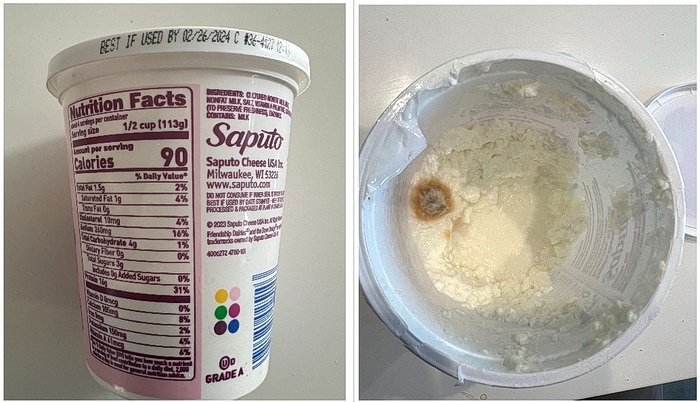Decayed Cheese! Be Careful!

If you’re a cheese lover, you probably can’t resist trying out the different varieties from time to time. However, one concern is the possibility of eating cheese that has gone bad.
In this article, we’ll be discussing the effects of eating cheese that has decayed. We’ll start with the most important factor – what to look for when cheese goes bad, and then we’ll go into detail about why this happens.
Detecting Decaying Cheese

This can be a bit tricky as it depends on the type of cheese, its age, and how it has been stored. However, here are a few general signs to look out for when determining whether cheese has gone rotten:
- Expiration Date: This is the first thing you should check and that starts at the grocery store. Avoid buying cheese that is close to its expiration date. Once it is home and in the fridge, periodically check the expiration date. If the cheese is a few days past its expiration date, it may not be safe to eat, and depending on how long past the date is, it may be best to throw it out.
- Appearance: Check the cheese for any signs of mold or discoloration. While some types, such as blue cheese, have mold in them as part of the aging process, other types should not have any visible mold. If the cheese appears slimy, discolored or has a strange texture, it could be a sign of spoilage.
- Smell: Take a whiff. If it has a pungent, sour, or ammonia-like odor, it may be spoiled. Fresh cheese should have a mild and pleasant aroma.
- Taste: Give the cheese a taste. That means taste. Not eat! If it has a bitter or sour taste, it could be spoiled. If it has a sharp or overly tangy taste, it may have been over-aged.
- Texture: If the cheese has a mushy texture or appears to be separated, it could be spoiled. A hard cheese like cheddar or parmesan should not be soft or rubbery.
If you are in doubt, it’s best to err on the side of caution and throw it away. Eating spoiled cheese can cause foodborne illnesses and other health problems.
What Causes Cheese to Decay?
Cheese is a dairy product that is made by taking milk proteins and separating them from the whey (watery part). It is then aged for a certain period, depending on the variety of the cheese. Like any other food item, cheese can go bad if not handled properly.
The main causes of decay are:
- Contamination: Cheese can get infected by bacteria, mold, or other microorganisms. This can happen during the production process or due to improper storage conditions.
- Improper Storage: Cheese should be stored at a specific temperature and humidity level to prevent it from spoiling. If the storage conditions are not optimal, cheese can go bad quickly.
The Dangers of Eating Bad Cheese
The severity of the effects depends on the type of cheese and the extent of spoilage. Here are some of the dangers:
Mild Effects
Mild effects of eating bad cheese include an upset stomach, diarrhea, and nausea. These symptoms can occur due to the presence of harmful bacteria in the cheese.
Moderate Effects
Moderate effects include fever, abdominal cramps, and vomiting. These symptoms can occur due to the presence of toxins produced by bacteria in the cheese.
Severe Effects
Severe effects include kidney failure, meningitis, and sepsis. These symptoms can occur due to the presence of dangerous bacteria like Listeria or E.coli in the cheese.
What to Do If You’ve Eaten Cheese That Has Gone Bad
If you are experiencing symptoms like nausea, vomiting, or diarrhea, it’s important to seek medical attention immediately. Your doctor will be able to diagnose the problem and prescribe appropriate treatment.
Prevention Tips
Preventing cheese from going bad starts with proper handling and storage. Here are some tips for avoiding bad cheese:
Store It Properly
Cheese should be stored at a specific temperature and humidity level. Check the label for proper storage.
Use Proper Handling Techniques
Always use clean utensils and cutting boards. Keep your hands clean and avoid touching the cheese, as this can introduce bacteria and other microorganisms.
Conclusion and Final Thoughts on the Importance of Food Safety
In conclusion, eating bad cheese can have serious consequences on your health. Always take proper precautions when handling and storing cheese to avoid spoilage.
If you suspect that you’ve eaten bad cheese, seek medical attention immediately. Remember to always check the expiration date, store cheese properly, and use proper handling techniques. By following these tips, you can enjoy your favorite cheese without worrying about the dangers of eating bad cheese.
Always prioritize your health by taking food safety seriously. Be cautious about the cheese you buy and how you handle it. If you experience any symptoms of food poisoning, seek medical attention immediately.
